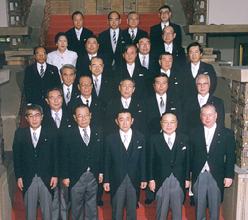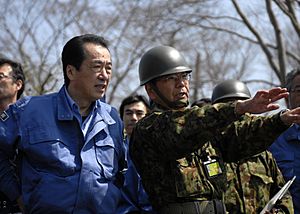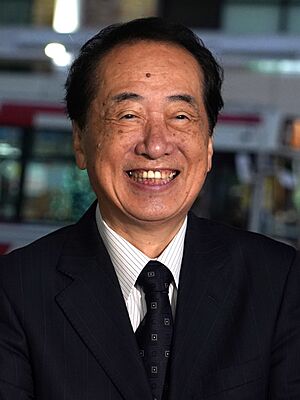Naoto Kan facts for kids
Quick facts for kids
Naoto Kan
|
|
|---|---|
|
菅 直人
|
|

Official portrait, 2007
|
|
| Prime Minister of Japan | |
| In office 8 June 2010 – 2 September 2011 |
|
| Monarch | Akihito |
| Preceded by | Yukio Hatoyama |
| Succeeded by | Yoshihiko Noda |
| Minister of Finance | |
| In office 6 January 2010 – 8 June 2010 |
|
| Prime Minister | Yukio Hatoyama |
| Preceded by | Hirohisa Fujii |
| Succeeded by | Yoshihiko Noda |
| Deputy Prime Minister of Japan | |
| In office 16 September 2009 – 8 June 2010 |
|
| Prime Minister | Yukio Hatoyama |
| Preceded by | Wataru Kubo (1996) |
| Succeeded by | Katsuya Okada (2012) |
| Minister of State for Economic and Fiscal Policy | |
| In office 16 September 2009 – 8 June 2010 |
|
| Prime Minister | Yukio Hatoyama |
| Preceded by | Yoshimasa Hayashi |
| Succeeded by | Satoshi Arai |
| Minister of State in charge of National Strategy | |
| In office 16 September 2009 – 6 January 2010 |
|
| Prime Minister | Yukio Hatoyama |
| Preceded by | Position established |
| Succeeded by | Yoshito Sengoku |
| Minister of State for Science and Technology Policy | |
| In office 16 September 2009 – 6 January 2010 |
|
| Prime Minister | Yukio Hatoyama |
| Preceded by | Seiko Noda |
| Succeeded by | Tatsuo Kawabata |
| Minister of Health and Welfare | |
| In office 11 January 1996 – 7 November 1996 |
|
| Prime Minister | Ryutaro Hashimoto |
| Preceded by | Chūryō Morii |
| Succeeded by | Junichiro Koizumi |
| Member of the House of Representatives from Tokyo |
|
| In office 22 October 2017 – 9 October 2024 |
|
| Preceded by | Masatada Tsuchiya |
| Succeeded by | Kaoru Fukuda |
| Constituency | 18th district |
| In office 16 December 2012 – 22 October 2017 |
|
| Preceded by | Hidehiro Mitani |
| Succeeded by | Shunsuke Ito |
| Constituency | PR Block |
| In office 20 October 1996 – 16 December 2012 |
|
| Preceded by | Constituency established |
| Succeeded by | Masatada Tsuchiya |
| Constituency | 18th district |
| In office 17 July 1980 – 20 October 1996 |
|
| Preceded by | Kiyoshi Ōno |
| Succeeded by | Constituency abolished |
| Constituency | 7th district |
| Personal details | |
| Born | 10 October 1946 Ube, Yamaguchi, Empire of Japan |
| Political party | CDP |
| Other political affiliations |
SDF (before 1993) NPS (1993–1996) DPJ(96) (1996–1998) DPJ(98) (1998–2016) DP (2016–2017) |
| Spouse |
Nobuko Kan
(m. 1970) |
| Children | 2 |
| Alma mater | Tokyo Institute of Technology |
| Website | Official website: http://www.n-kan.jp/ |
Naoto Kan (菅 直人, Kan Naoto, born 10 October 1946) is a Japanese politician. He served as the Prime Minister of Japan and leader of the Democratic Party of Japan (DPJ) from June 2010 to September 2011. He was the first Prime Minister since 2006 to hold the position for more than a year.
After leaving office, Naoto Kan was chosen by the United Nations Secretary-General Ban Ki-moon in August 2012. He became a member of a special UN group. This group worked on plans for global development goals after 2015.
Contents
Early Life and Education
Naoto Kan was born in Ube, Yamaguchi, Japan, on October 10, 1946. He was the oldest son of Hisao Kan. His father was a director at a company that made glass.
Kan studied at the Tokyo Institute of Technology and graduated in 1970. The next year, in 1971, he became a licensed benrishi. This is a special kind of patent agent or attorney in Japan.
Political Career in Japan's Parliament
After finishing college, Kan worked at a patent office for four years. He was very active in local community groups, often called grassroots movements. He also helped with election campaigns for Fusae Ichikawa, a famous activist for women's rights.
Joining the Diet
Kan tried to win a seat in Japan's parliament, called the Diet, several times. He ran in elections in 1976, 1977, and 1979 but did not win. Finally, in 1980, he won a seat in the lower house of the Diet. He was a member of the Socialist Democratic Federation party.
Later, he joined a new party called the New Party Sakigake. This party formed a government with another major party.
Minister of Health and Welfare
In 1996, Naoto Kan became the Minister of Health and Welfare. This was part of Prime Minister Ryutaro Hashimoto's government. While in this role, he became very popular across Japan. He openly admitted that the government was responsible for a serious health issue involving blood products in the 1980s. He also directly apologized to the people who were affected. This honest action was very unusual for a government official at the time. The media and the public praised him for it.
Forming the Democratic Party of Japan
In September 1996, after leaving his cabinet position, Kan helped create the Democratic Party of Japan (DPJ) with Yukio Hatoyama. In 1998, he took over as the leader of the DPJ after Yukio Hatoyama resigned.
In July 2003, the DPJ and the Liberal Party decided to join together. They wanted to form a strong opposition party for the upcoming general election. During the 2003 election campaign, the DPJ presented Naoto Kan as the main alternative to the current Prime Minister, Junichiro Koizumi. His face was used as a symbol for the campaign against the ruling party.
In 2004, Kan faced an issue regarding unpaid pension contributions. He resigned as party leader. However, the Ministry of Health, Labour and Welfare later apologized. They said the unpaid record was due to a mistake in their administration.
In 2005, Kan suggested creating a new political party. He called it the "Dankai (baby boomer) Party." This party aimed to involve Japan's large generation of baby boomers who were starting to retire. Kan also believes that Japan's military, the Japan Self-Defense Forces, should have a bigger role in international affairs.
Finance Minister (2010)
On January 6, 2010, Prime Minister Yukio Hatoyama chose Naoto Kan to be the new finance minister. He took on this important role in addition to being deputy prime minister. He replaced Hirohisa Fujii as finance minister.
In his first press conference, Kan said his main goal was to help Japan's economy grow. He even mentioned a specific exchange rate for the dollar and yen that he thought would help Japanese companies that export goods.
Prime Minister (2010–2011)
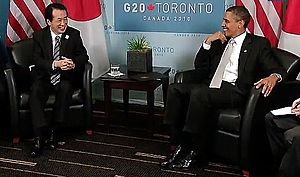
On June 2, 2010, Yukio Hatoyama announced he would resign as Prime Minister and leader of the DPJ. Kan then won the leadership election for the DPJ on June 4. He received 291 votes, beating Shinji Tarutoko.
Later that day, the Diet officially named Kan as the new Prime Minister. On June 8, Emperor Akihito formally appointed him as the 94th Prime Minister of Japan. His new government, known as the Kan Cabinet, was formed that same day.
Challenges and Policies
Kan's approval ratings dropped in June after he suggested increasing the sales tax. This idea was not popular, even within his own party, and he quickly scaled it back. This tax proposal was partly blamed for the DPJ losing its majority in the July 2010 House of Councillors election. This meant the DPJ had to work with smaller parties to pass new laws.
In August 2010, Kan apologized to South Korea. This was on the 100th anniversary of the Japan–Korea Annexation Treaty.
In September, Ichirō Ozawa challenged Kan for the leadership of the DPJ. Kan won the vote among DPJ lawmakers. He also had strong support from party members and the public. After winning, Kan changed his cabinet. Many members who supported Ozawa lost their important positions.
On September 7, 2010, a Chinese fishing boat captain was arrested by the Japan Coast Guard near the Senkaku Islands. China claims these islands and protested the arrest. The captain was released on September 24. This event caused relations between China and Japan to become very tense.
In mid-September, Kan's government took action to weaken the Japanese yen. They bought U.S. dollars to help Japanese companies that export goods. This move was popular with businesses and the public. In October, the Kan cabinet approved a large spending plan to further weaken the yen and fight deflation.
In November, Kan strongly supported South Korea and criticized North Korea after the bombardment of Yeonpyeong.
Fukushima Nuclear Accident Response
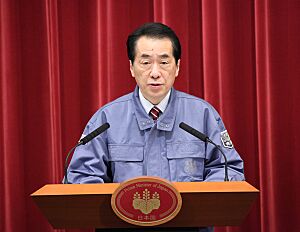
On March 11, 2011, a huge earthquake and tsunami hit northeastern Japan. Kan quickly flew to the Fukushima I Nuclear Power Plant the next morning. He was deeply involved in the efforts to respond to the Fukushima nuclear accident.
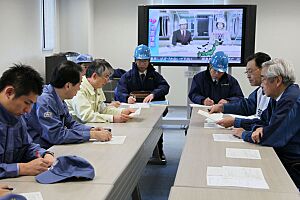
Kan worked closely with officials from Tokyo Electric Power Company (TEPCO), the company that ran the plant. He made important decisions to try and cool down the damaged reactors. He also ordered the creation of a joint team between the government and TEPCO. This helped improve communication during the crisis.
For a week after the disaster, Kan slept in the Prime Minister's Office. He wore blue work clothes instead of a suit to show his dedication.
After the Fukushima disaster, Kan became strongly against nuclear power. In May, he ordered the Hamaoka Nuclear Power Plant to close due to safety concerns. He also said he would stop plans to build new nuclear reactors.
Despite his popularity falling, Kan refused to step down while Japan was dealing with the earthquake, tsunami, and nuclear crises. In July 2011, Kan stated that Japan needed to rely much less on nuclear energy. He wanted to stop plans to build 14 new reactors by 2030. He also supported a law to promote renewable energy.
After he resigned as prime minister, Kan said in 2012 that the Fukushima accident showed him that Japan must greatly reduce its use of nuclear power. He became a strong supporter of renewable energy sources like solar power. He also mentioned that at one point, there was a risk that people might not be able to live in the Tokyo area. He said this made him realize the danger of a bigger nuclear crisis.
Resignation
Kan announced his plan to resign on August 10, 2011. On August 26, after important bills were passed, he expected his successor to take office soon. Yoshihiko Noda, who was the finance minister, was elected as the new leader of the DPJ. As the leader of the largest party, Noda then became the new Prime Minister.
Life After Being Prime Minister
In the December 2012 election for the Governor of Tokyo, Kan supported Kenji Utsunomiya. Utsunomiya shared Kan's views against nuclear power. However, Utsunomiya came in second place.
In the 2012 general election, Kan lost his direct seat in the Tokyo 18th district. But he still kept a seat in the Diet through a special system called proportional representation. He lost his district seat again in the 2014 general election but was re-elected through the proportional block.
Before the 2017 general election, he joined the Constitutional Democratic Party of Japan. In that election, he won back his district seat, beating the previous representative. In 2023, Kan publicly stated that he would not run for a seat in the House of Representatives again. His term ended in October 2024. He said he would likely still be involved in politics in some way.
Personal Life
Naoto Kan married Nobuko Kan in 1970. Nobuko was born in Okayama Prefecture. They are first cousins, so their engagement faced some opposition from their parents. They have two sons, Gentarō and Shinjirō.
Gentarō is a social activist. He ran for the House of Representatives in 2003 and 2005 but did not win. He later worked as a political secretary for his father. In December 2023, he was elected to the Musashino City Council. Shinjiro is a veterinarian and works at an animal hospital in Nerima, Tokyo.
Naoto Kan is sometimes called "Ira-Kan," which means "Fretful Kan," because he is known for having a quick temper. His hobbies include playing go, shogi, and making origami. In 1973, Kan even built a machine to help calculate points in the game of mahjong and applied for a patent for it.
See also
 In Spanish: Naoto Kan para niños
In Spanish: Naoto Kan para niños
 | Bessie Coleman |
 | Spann Watson |
 | Jill E. Brown |
 | Sherman W. White |


